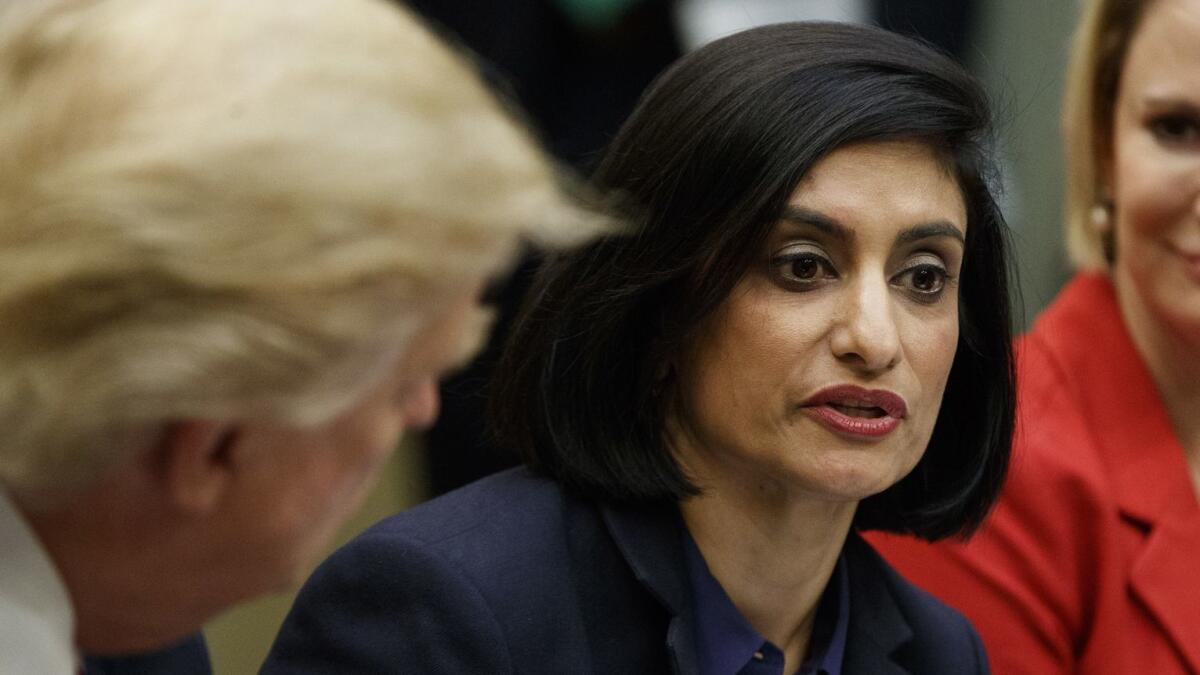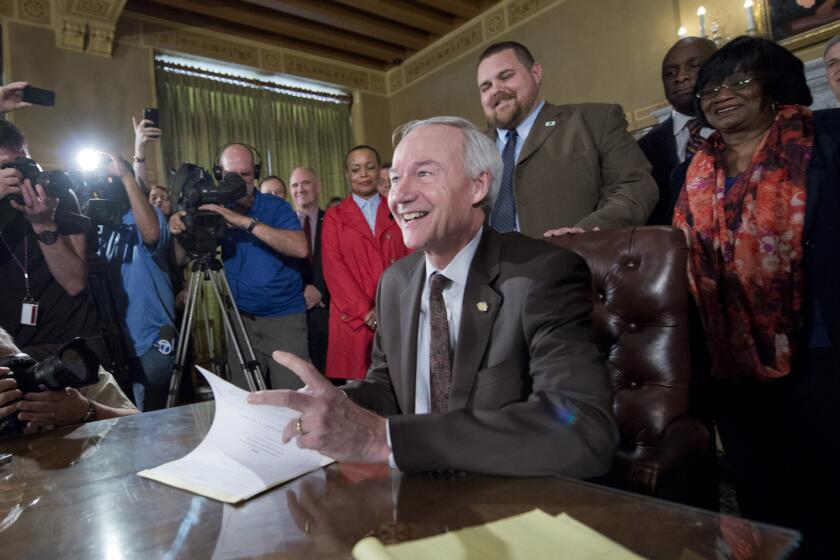Column: GOP’s brilliant healthcare idea is to throw thousands of Americans off Medicaid

- Share via
The Trump administration and a couple of Republican states have just revealed an important secret about GOP healthcare policy: It’s based on spending more taxpayer funds to cover fewer people through Medicaid.
If that seems to contradict the GOP’s self-image as a protector of taxpayer funds and avatar of efficient public management, well, it is what it is.
In a nutshell, the administration has just approved limited Medicaid expansion proposals from Georgia and Nebraska that will cost those states more than full expansion would cost.
All of these misguided ideas have been kicking around for a long time, and most of them are finding a home in the Georgia waiver.
— Joan Alker, Georgetown University
They could result in thousands of low-income residents losing their health coverage, and will involve such complicated administrative procedures that they’re almost guaranteed to fail on every level.
The approvals are in the form of waivers from Medicaid rules and are applicable to Medicaid expansion under the Affordable Care Act. In general, those waivers are allowed by law only if they’re judged to advance the goal of Medicaid, which is chiefly to bring coverage to low-income households.
Both states intend to impose work requirements of as much as 80 hours per month on Medicaid recipients and to charge premiums for coverage. Neither option is specifically permitted by federal law.
The Georgia plan in particular is “a smorgasbord of bad ideas,” says Joan Alker, director of Georgetown University’s Center for Children and Families. “All of these misguided ideas have been kicking around for a long time, and most of them are finding a home in the Georgia waiver.”
Work requirements are especially useless and burdensome. Although they’re favored by the Trump administration, they’re conclusively disfavored by federal courts, which have overturned or suspended them in every state that has tried or proposed them, including Arkansas, Kentucky and New Hampshire.
Nothing divides Joe Biden and Donald Trump as much as their positions on healthcare reform.
Data from the program in Arkansas, the only state that actually had implemented work rules for Medicaid before a federal judge threw them out, showed that they did nothing to help Medicaid recipients find jobs, but did result in 17,000 Arkansans losing their Medicaid coverage and the state’s percentage of uninsured residents soaring even before the program was fully in place.
The fact is that work rules achieve so little in part because the vast majority of Medicaid recipients are already working or are exempt because they’re students, seniors, disabled or caring for family members at home.
One might call these proposals penny-wise and insanely foolish, except that they’re not even penny-wise.
“It’s extraordinary and horrifying how much time/energy the Trump Administraton ... is putting into complex ways to prevent/limit people’s access to health care during a pandemic and a recession,” Alker tweeted Tuesday.
Georgia’s waiver allows it to expand Medicaid to childless individuals with incomes up to 100% of the federal poverty limit — $12,760 for an individual. But that falls short of the ACA’s expansion terms, which call for enrolling residents earning up to 138% of the poverty line, or $17,609.
As a result, the federal government refused Georgia’s request for a federal reimbursement of 90% of its spending on expansion patients, as permitted by the ACA.
Instead, the state will receive only the traditional Medicaid reimbursement, or 67.03%. (States are entitled to an additional 6.2 percentage point reimbursement during the COVID-19 pandemic, but that will end once the emergency is declared over.)
That’s because the full ACA reimbursement is only available for full expansion. Georgia says its partial expansion will enroll about 64,000 residents; estimates of full expansion, however, say that it would cover as many as 255,000.
In other words, Georgia will spend more out of its own taxpayers’ pockets to cover about one-fourth of the residents who would be served by full expansion. The difference can be measured in the tens of millions of dollars.
Utah, which pioneered this self-destructive idea in 2019 by covering only 90,000 residents in its partial expansion instead of the 150,000 who would have been served by full expansion, estimated that it would lose $69 million in federal funding in the program’s first two years, compared to what it would have received in full expansion.
Nebraska’s plan is to expand Medicaid to the full population of residents earning less than 138% of the poverty line. But like Georgia, its waiver imposes a panoply of rules and regulations that serve as obstacles to coverage.
President Trump ignores the COVID-19 pandemic and record unemployment to push work requirements for Medicaid recipients.
Both states’ programs encompass “wellness” provisions allowing residents to accrue credits by attending smoking cessation classes or reporting other healthy behaviors, which can used for eyeglasses, dental care or other services not covered by Medicaid.
The work requirements and other rules only raise obstacles to coverage for residents, who often find the reporting process opaque and can lose their eligibility merely for failing to navigate the administrative labyrinth.
The reporting requirements connected with work rules and wellness programs “assume that everybody in that population understands the complexities of all these different pieces,” Alker says. “Even as a health policy researcher, it’s hard for me to follow when you read the pages and pages. The state would have to spend an enormous amount of money on outreach and education if it’s truly sincere about changing behaviors.”
Indeed, administering work requirements alone cost Arkansas more than $24 million in the program’s first 18 months, according to the Government Accountability Office, which attributed the sum to upgrading the state’s information technology systems, performing outreach to beneficiaries and analyzing data.
Federal Judge James E. Boasberg, who blocked work requirements, did Kansas a big favor: The GAO estimated that implementing its work rules in that state would have cost more than $271 million over two years.
Restricting Medicaid expansion to residents earning up to 100% of the poverty level, as Georgia and Utah are doing, imposes another subtle cost — it makes the Medicaid coverage pool more expensive. When the population earning between 100% and 138% of poverty is steered toward the ACA marketplace, as is the practice in those two states, they make the ACA plan pool more expensive, too.
“The 100-138% population is the sickest population in the ACA exchanges and the healthiest adult population in Medicaid,” David Anderson, a health insurance expert at Duke University, told me. As a result, “they bring down average costs in Medicaid.”
Seema Verma, the federal official in charge of Medicare, Medicaid and the Affordable Care Act, has blasted into the limelight. And not in a good way.
States may find this option attractive, however, because although “subsidizing individuals to enroll in private plans is more expensive than covering those same people on Medicaid,” the ACA subsidies are covered entirely by the federal government, Anderson says.
Yet that only raises the question of why the federal government would be willing to approve such half-baked proposals. The answer lies in ideology. Republican orthodoxy is traditionally hostile to Medicaid, the only federal healthcare program aimed at low-income households, and especially hostile to Medicaid expansion.
The chief carrier of this particular virus in the Trump administration is Seema Verma, head of the Centers for Medicare and Medicaid Services. Verma’s willingness, even enthusiasm, for trampling Medicaid standards has made her a threat to public health, as I’ve reported.
Brought into the federal government by Vice President Mike Pence, whom she served as a healthcare consultant while he was Indiana governor, Verma created a restrictive Medicaid program for that state that is currently under legal attack. (The lawsuit is on hold during the pandemic.)
Verma has defended work requirements on the grounds that they supposedly steer Medicaid enrollees into the health-giving environment of employment. As many experts have pointed out, however, that’s the reverse of how Medicaid and employment operate — good health empowers people to find and keep jobs. Imposing work requirements as an obstacle to health coverage simply denies people the opportunity to work.
Therein lies the real goal of Republican healthcare: Limit enrollment by forcing people to jump through ever more hoops before they can get care. The cruelty and ineffectiveness of this approach is its preexisting condition, and it will only make Americans sicker if it’s allowed to remain untreated.
More to Read
Inside the business of entertainment
The Wide Shot brings you news, analysis and insights on everything from streaming wars to production — and what it all means for the future.
You may occasionally receive promotional content from the Los Angeles Times.














